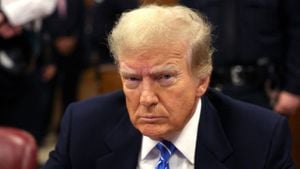Violence erupted recently in Sambhal, Northern India, after tensions flared over a court-ordered survey of the Shahi Jama Masjid, leading to the tragic deaths of four individuals and multiple injuries among protestors and police force members. The mosque, built during the Mughal era, is at the center of fierce disputes, amplified by claims from local Hindu groups who allege it was constructed on the ruins of a Hindu temple. The unrest has brought the already fraught relations between Hindu and Muslim communities to the fore, raising alarms over the potential for communal conflict.
The chaos began on November 24, when protesters, angered by the survey's implementation without adequate notice, clashed with police forces who were present to maintain order. Eyewitness accounts indicate the situation escalated quickly, as reports surfaced of stone-pelting from the crowd. This prompted police to respond with tear gas and, according to some protesters, live ammunition, leading to panic and chaos.
Authorities reacted by imposing internet restrictions, banning gatherings, and dispatching additional police units to the area to control the situation. District Magistrate Rajender Pensiya reported during press briefings, "The state police were justified for their actions, as they were ensuring the safety of survey officials executing court orders. Misleading statements circulated are exacerbative, making the situation delicate.”
On the other hand, members of the local mosque management committee, led by President Zafar Ali, expressed outrage over the conduct of police and local government. Ali accused officials of erroneously executing the survey and claimed responsibility for stoking violence lay squarely on their shoulders. He stated, "The administration had forced the survey without adequate notification to us, leading to tensions and confusion among the community."
Sambhal has experienced unrest over previous weeks leading up to the clashes, several legal cases were underway reflecting the contentious atmosphere. The local court's decision to initiate the survey stemmed from petitions alleging the mosque was erected atop the ruins of prior Hindu place worship. Legal proceedings of such nature have become increasingly commonplace across India, driven by nationalist fervor from groups claiming numerous mosques have been unlawfully established over historical temples.
Social media has played a pivotal role by rapidly disseminated allegations and misinformation surrounding the survey. Reports suggested protestors believed excavation work was occurring during the survey, sparking outrage and prompting larger gatherings against perceived threats to their religious sites. The court's proceedings have been heavily criticized by community leaders for their rushed nature and lack of transparency.
The aftermath of the violence saw the police filing numerous First Information Reports (FIRs), detailing accusations against over 2,500 individuals, including local political leaders. Among the accused is Samajwadi Party MP Zia-ur-Rehman Barq, who faced allegations of inciting the mob; Barq, vehemently denied these claims, asserting he was not even present during the eruption of violence. He described the allegations as politically motivated, stating, "It is very unfortunate; this incident appears to have been pre-planned to deflect attention from other pressing issues.”
Political leaders from the opposition parties, including the Samajwadi Party and Congress, have criticized the ruling Bharatiya Janata Party (BJP) government, alleging they have facilitated these tensions for electoral gains. Former Uttar Pradesh Chief Minister Akhilesh Yadav remarked, "The BJP’s actions directly lead to subsequent violence aimed at communities historically marginalized under their regime. Prompt action must be taken to investigate and prevent such incidents from reoccurring.”
The communal strife has reignited discussions about India's legislative framework, especially the 1991 Places of Worship Act, which safeguards the religious character of worship places as existed on August 15, 1947. Critics contend this legislation, intended to prevent communal conflicts like those witnessed during the Babri Masjid riots, appears increasingly disregarded under the current political climate.
Minority communities, particularly Muslims, feel targeted as numerous petitions challenging existing places of worship proliferate through the judiciary, often fueled by nationalistic sentiments backed by the ruling party. Legal experts highlight the contradiction of the court’s sanctioning of archaeological surveys against the spirit of the Places of Worship Act, stating it risks opening Pandora’s box of religious disputes.
With the situation still tense, and authorities on high alert, the community is left grappling with fear for their safety and properties, as the violence serves as yet another painful chapter within India’s long history of communal conflicts. Despite the government's measures to restore peace, local residents remain skeptical about their safety as communal ties fray. Community leaders have emphasized the urgent need for dialogue and mutual respect among diverse religious groups to bridge the divide exacerbated by political maneuvering.
Looking ahead, it's clear the path to healing will be contingent on transparently addressing the grievances raised during these events, reestablishing trust, and ensuring the rule of law takes precedence over ideological claims. The tragedy has cast shadows over Sambhal, but one can only hope this might serve as impetus toward comprehensive reforms aimed at preventing recurrence of such violent outbursts.
What is abundantly clear, is the recognition of the cost of such violence—lives lost, families shattered, and communities divided, makes peace not just desirable but imperative. Only time will tell if cooler heads will prevail as the waves of anger continue to ripple through Indian society.



